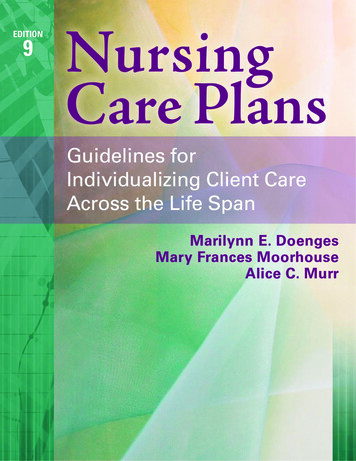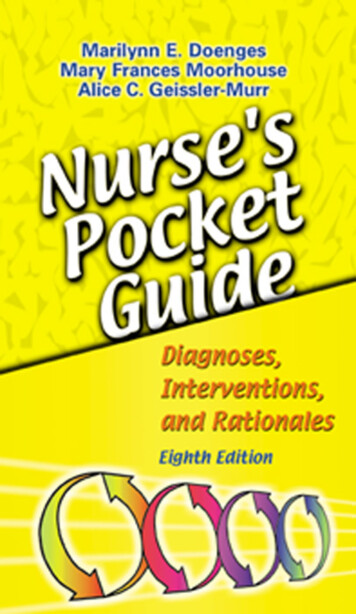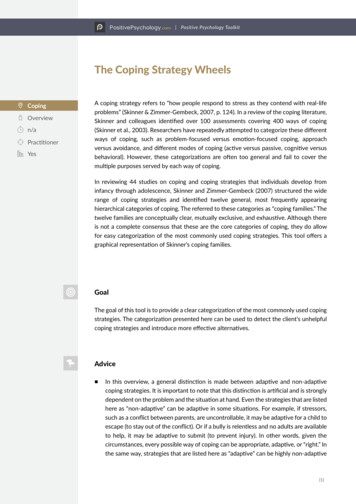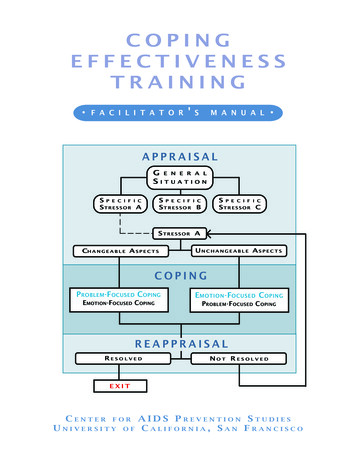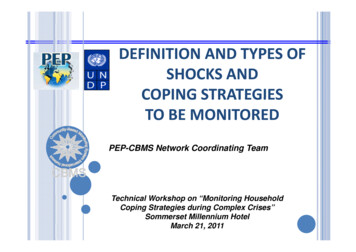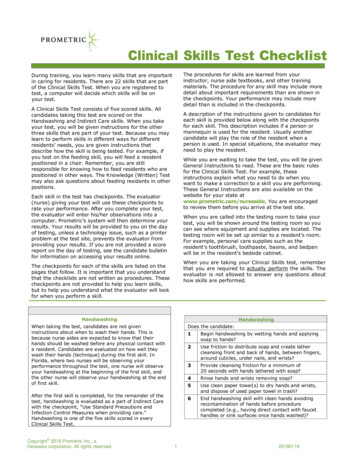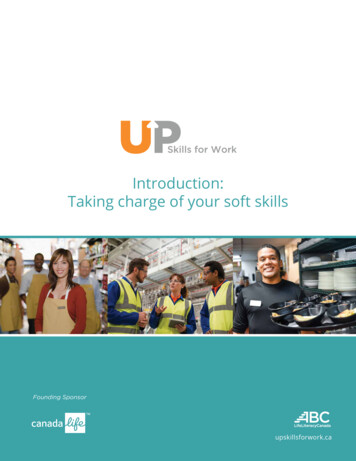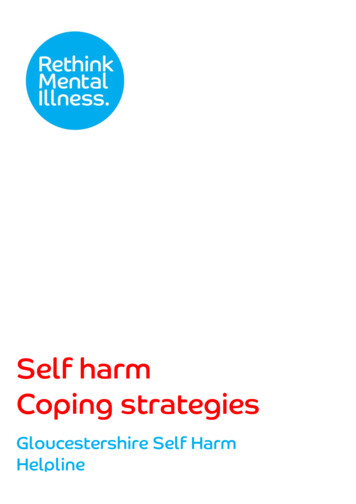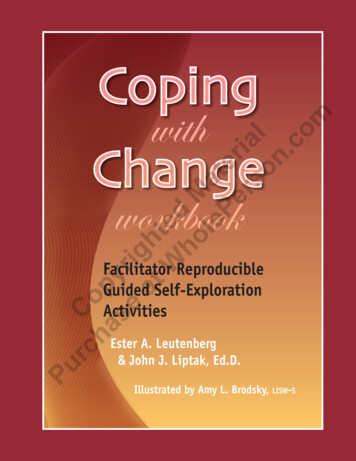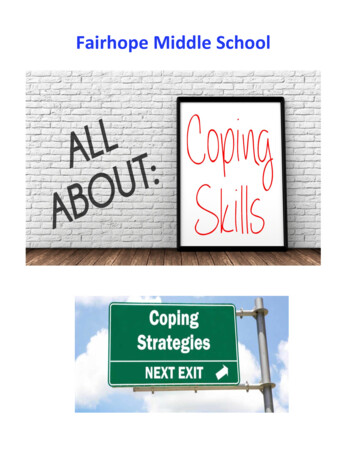
Transcription
Fairhope)Middle)School
%SkillsSelf7 %Coping%Skills%List
icult'times
SELF9TALK%and%COPINGSelf%Talk%Is .The%Internal%Voice%In%Our%Head!Our internal conversation !It determines how we perceive situations!It is our thoughts and our nfluences%how%we%feel.
your%life?
Challenging)the)Self-Talk!Disputing als?I)Can’t)Do)This!)I)CAN)DO)THIS!
m/watch?v /www.youtube.com/watch?v RVA2N6tX2cg
help!Getting(enough(sleep
%Feel?%How?
Coping SkillsCoping skills are things we can do to make ourselves feel better when we are goingthrough difficult times.The activities listed below are things you can do to help you feel better when you areupset.Take Care of Yourself:Eat Healthy FoodSleep WellUnderstand How You FeelExercise:Go for a WalkRide a BikeDo YogaDo Things You Enjoy:DrawEnjoy NatureLaughSingHang Out with FriendsPlay a GameWatch a MoviePaintListen to MusicMake a PlaylistMake a List of Things You LikeChange Your Thoughts by Usingdifferent Parts of Your Brain:ReadWrite a Story or PoemSet a GoalLearn Something NewJournalKeep a Positive Attitude:Make a List of Things You LikeFocus on What You Can ControlSay Positive AffirmationsUse a Stress BallTake 10 Deep BreathsHelping Other People Can Shift OurFocus and Make Us Feel Better.Perform a Random Act of KindnessGet Help:Talk to a FriendTalk to a Trusted AdultGet Away from the Problem: thehelpfulcounselor.com
Here are some additional examples of self-talk statements for you to use. Pick a few to practice.A.Preparation for StressI’ve succeeded with this before.What exactly do I have to do?I know I can do each one of these tasks.It’s easier once I get started.I’ll jump in and be alright.Tomorrow I’ll be through it.I won’t let negative thoughts creep in.B.Facing a ChallengeI will take it step by step; I won’t rush.I can do this; I’m doing it now.I can only do my best.Any tension I feel is a signal to use my coping exercises.I can get help if I need it.If I don’t think about fear, I won’t be afraid.If I get tense, I’ll take a deep breath and relax.It’s OK to make mistakes.C.Coping with FearRelax now!Just breathe deeply.There’s an end to it.Keep my mind on right now—on the task at hand.I can keep this within limits I can handle.I can always callI am only afraid because I decided to be. I can decide not to be.I’ve survived this and worse before.Being active will lessen my fear.D.Self-CongratulationsI did it!I did alright.I did well.Next time, I won’t have to worry so much.
I am able to relax away anxiety.I’ve got to tell about this.It’s possible not to be scared.All I have to do is stop thinking I’m scared.E.AffirmationsEvery day in every way I grow stronger and stronger.I enter this day with a peaceful heart.
These are some examples of positive affirmations. These statements can help students fight their negativethoughts. Affirmations can help when students are thinking negative thoughts or even when they are notthinking negatively. Affirmations work better and faster the more times a student says them. Students maysay these affirmations to themselves several times daily, or they may post them around their house so theycan look at them until they sink in. If students do not like these affirmations, encourage them to create 4.35.36.I am responsible and in control of my life.Circumstances are what they are, but I can choose my attitude towards them.I am becoming prosperous.I am creating the financial resources I need.I am setting priorities and making time for what is important.Life has its challenges and its satisfactions; I enjoy the adventure of life.Every challenge that comes along is an opportunity for me to learn and to grow.I accept the natural ups and down of life.I love and accept myself the way I am.I deserve the good things in my life as much as anyone else.I am open to discovering new meaning in my life.It’s never too late to change.I am improving one step at a time.I am innately healthy, strong, and capable of recovering.I am getting better every day.I am committed to overcoming my condition.I am working on recovering from my condition.I can recover by taking small risks at my own pace.I am looking forward to the new freedom and opportunities I’ll have when I’ve recovered.I am learning to love myself.I am learning to be comfortable by myself.If someone doesn’t return my love, I let it go and move on.I am learning to be at peace with myself when alone.I am learning how to enjoy when alone.I respect and believe in myself apart from others’ opinions.I can accept and learn from constructive criticism.I am learning to be myself around others.It’s important to take care of my own needs.It’s okay to be myself around others.I appreciate my achievements and I’m much more than all of them put together.I am learning how to balance work and play in my life.I am learning that there is more to life than success.The greatest success is living well.I am a unique and capable person just as I am.I am proud of doing the best I can.It’s okay to make mistakes.
37.38.39.40.41.42.43.I am willing to accept my mistakes and to learn from them.I am willing to allow others to help me.I acknowledge my need for other people.I am open to receiving support from others.I am willing to take the risk of getting close to someone.I am willing to relax and to let go.I am learning to accept those things I can’t control.
Replacement ThoughtsInstead of ThinkingMustShouldHave toCan’tOughtAllAlwaysCan’t standAwfulBad personI am a failurePreferChoose toWantChoose not toHad betterManyOftenDon’t likeHighly undesirableBad behaviorI failed atInstead of SayingI have to do well.You shouldn’t do that.You never help me.I can’t stand my job.You are a bad boy.I’m a loser.Instead of y ThinkingExchange WithI want to do well.I prefer you not do that.You rarely help me.I don’t like my job.That behavior is undesirable.I failed at this one task.Exchange ncern for my relationship
Positive Self-Talk/Coping Thoughts WorksheetPositive statements encourage us and help us cope through distressing times. We can say theseencouraging words to ourselves and be our own personal coach. We have all survived some verydistressing times, and we can use those experiences to encourage us through current difficulties.Examples of coping thoughts might be: Stop and breathe; I can do this. This, too, will pass. I can be anxious/angry/sad and still deal with this. I have done this before, and I can do it again. This feels bad; however, it’s a normal body reaction. It will pass. This feels bad, but feelings may sometimes be wrong. These are just feelings; they will go away. This won’t last forever. Short term pain for long term gain. I can feel bad and still choose to take a new and healthy direction. I don’t need to rush; I can take things slowly. I have survived before, so I will survive now. I feel this way because of my past experiences, but I am safe right now. It’s okay to feel this way; it’s a normal reaction. Right now, I am not in danger. Right now, I’m safe. My mind is not always my friend. Thoughts are just thoughts—they are not necessarily true or factual. This is difficult and uncomfortable, but it’s only temporary. I can use my coping skills and get through this. I can learn from this and it will be easier next time. Keep calm and carry on.Write down a coping thought or positive statement for each difficult or distressing situation—something youcan tell yourself that will help you get through. Write them down on a piece of card and carry it in yourpocket or handbag to help remind you.Difficult or Distressing ThoughtCoping Thought/Positive StatementEx: I always feel so awkward around people.Ex: Just because I feel awkward does not meanthat others see me that way.
Learning to be G.L.A.D.G: Something you were grateful for today.Think of something very basic for which you are grateful. It could be something as simple as the sunlight orthe nourishing food you eat. Write it below.Now think of something truly important in your life like a meaningful relationship, kids, friends, or yourhealth. Write it below.L: Something you learned today.Write down something positive you learned about yourself today. It might be something you already knew,but it came into focus today.Write down something you learned about another person today. Again, it might be something you werealready aware of, but you were more aware of this quality today.Write down a fact you learned today that made you curious or more aware of the world around you.Write down how something you learned today which changed your perspective of yourself or the worldaround you in a positive way.A: One small accomplishment you did today.Many people feel that accomplishments have to be a big important task, but it’s the little things that make adifference in your life. Perhaps you are working on a goal like exercising or eating healthier or finding anew job. Small steps towards your goal are important accomplishments.Write down something you accomplished today.
D: Something that brought you delight today.What made you laugh or smile?What small thing of beauty did you see today?What did you hear today that lifted your spirits? A song? A child’s voice? A joke?Now close your eyes and think of your day and what you wrote. Breathe deeply for a few minutes andvisualize a positive image from the day. Write down something important from this exercise that you wantto remember.
Cognitive Distortions For TeensMind Reading: You assume you know what people thinkingwithout having evidence or proof of their thoughts. “He thinks I’man idiot.” “I’m not going to make the team”Future-Telling: You predict the future – that things will getworse or that there’s danger ahead. “If I go, people will makefun of me.” “If I talk, I will mess up and not say what I mean.”Catastrophizing: You believe what mighthappen will be so awful and unbearable that you won’t be able tostand it. “It would be terrible if I failed.” “If I make a bad gradethen I will never get into a good college.”Labeling: You assign general negative traits to yourself andothers. “I’m disgusting.” “He’s horrible.” “She’s irrelevant.”Discounting Positives: You claim that thepositives that you or others have don’t matter. “That’s what I’msupposed to do, so it doesn’t count.” “Those successes were easyso they don’t matter.”Negative Filter: You focus almost exclusively on the negativesand seldom notice the positives. “Look at all the terrible thingson the news.” “Girls never have anything nice to say.”Overgeneralizing: You perceive the likelihood of a negativeoutcome based upon a single incident. “I fail all the time.”All-or-None Thinking: You view events or peoplein all-or-none/black-and-white terms. “It was awaste of time.” “I get rejected by everyone.”“Nothing ever goes my way.”Shoulds: You interpret events in terms of how things should berather than simply focusing on what is. “I should do well; if I don’t, I’m a failure.”
Personalizing: You attribute a most of the blame to yourself fornegative events and fail to see that certain situations are alsocaused by others. “My relationship ended because I wasn’t funenough.” “It was my fault my group got a badgrade.”Blaming: You focus on the other person as the source of yournegative feelings and refuse to take responsibility for changingyourself. “She’s to blame for the way I feel.” “My parents causedall my problems.” “My teacher is the reason I’m not doing well.”Judgment Focus: You view yourself, others, and events in terms ofevaluations of “good” and “bad” or “right” and “wrong” rather thansimply describing, accepting, or understanding. “I didn’t performwell.” “I tried it, and I just kept doing it wrong.” “Look how successfulshe is, I’m not that successful.”Regret Orientation: You focus on the idea that you could havedone better in the past, rather than on what you can do betternow. “I could have had a better job if I had tried harder.” “Ishouldn’t have said that.” “I always mess up.”What if: You keep asking a series of questions about what ifsomething happens, and fail to be satisfied with any of the answers.“Yeah, but what if I get anxious, and I can’t catch my breath.”Emotional Reasoning: You let your feelings guide yourinterpretation of reality. “I feel sad, therefore I must bedepressed.” “I feel anxious, therefore I must be in danger.”Inability to Disconfirm: You reject any evidence orarguments that might contradict your negative thoughts. “I’munlovable – my friends hang out with me only because they must feelsorry for me.” “I’m a bad person – I only help others because it makesme feel better about myself.”Unfair Comparisons: You interpret events in terms ofstandards that are unrealistic. “Others did better than I did on thetest.” “People my age are more successful than I am.”
YOU WERE BORNTO BE REAL, NOTTO BE PERFECT.IT’SOK.The greatest weapon against stress is ourability to choose one thought over another.KEEP GOING,YOU AREGETTINGTHERE.“KNOW WHO YOU AREAND KNOW IT’S ENOUGH.“You have to fightthrough somebad daysto earn thebest daysof your life.WHATCONSUMESYOUR MIND,CONTROLSYOUR LIFE.Change the way you see things,and the things you see will change
Name the Pattern!Negative ThoughtI got into trouble at schooltoday. I just know they’re goingto kick me out tomorrow.Dysfunctional PatternJumping to Conclusions(Fortune-Telling)(also a bit ofCatastrophizing)Rational, PositivethoughtI did something at schooltoday that I’m not proud of,but everyo0ne makesmistakes and it’s not theend of the world! I’ll tryharder tomorrow not tomake the same mistakeagain.My friend looked at his watchwhen I was talking today. Hemust be thinking I’m boring.PersonificationI can’t know for certain whymy coworker looked at hiswatch when I was talking. Ifhe thought I was boring, heprobably wouldn’t comeover to talk to me every day!I got an award at the assemblyyesterday, but that’s no bigdeal. I’m not really that good ofa student.Minimizing PositivesI worked really hard to getthat award! My hard workreally paid off!If I don’t get a date to thehomecoming dance, there’s’ noway I could ever go back toschool and face my classmatesagain!CatastrophizingIt would be really difficultnot to get a date to thedance, but I could still gowith my friends and have agood time. Maybe there’ll beother people there withoutdates!There’s no way I could ever beas talented as the starquarterback on the footballteam. I shouldn’t even try.ComparisonOur star quarterback isreally talented! Even if I’mnever quite as good as he is,it doesn’t mean I shouldn’tplay. There are lots of otherthings I’m good at!
I only got a B on my readingtest. I always fail. I shouldn’thave even tried.All - Or - NothingEven though a B isn’t what Iwas hoping for on that test,it’s still pretty good! Nexttime I could study evenmore and see if can do evenbetter!I can’t believe I gained 3pounds. I’m so fat and ugly.Maximizing NegativesWow. I didn’t realize I’vegained 3 pounds, but thatdoesn’t define all of who Iam. I’ll just make sure to getmy exercise in 3 times thisweek and stop havingMountain Dew with everymeal.My teacher didn’t answer meJumping to Conclusionswhen I said hello to her this(Mind Reading)morning. She’s probably mad atme for something.My teacher didn’t answerme when I said hello to herthis morning. She might beupset with me, but I can’tknow that for sure unlessshe tells me so. May be shedidn’t hear me?Another student called me aname once today. People arealways making fun of me.OvergeneralizationA student teased me today,but that’s his problem! Lotsof other people are friendswith me. I don’t need todwell on one negativeexperience.I must get all A’s to be a goodstudent.Shoulds/MustsI’m a good student as longas I do the best that I canand work hard each day. Idon’t have to be perfect.I hate how I look, so I must lookugly to everyone else too.Emotional ReasoningJust because there aresome things I don’t likeabout my appearancedoesn’t mean everyonefeels that way! No one isperfect!
Imagery1. uctured*and*purposeful.*It can*be*very helpful*whenyou’re*upset*or stressed out. The*rule*of*thumb*for*imagery*should*be “more*than*a*minute,*less*than anhour.” It*is a*short*escape*from*an upsetting situation.2. There*are*lots of*ways*to use*imagery*to*relax.*You can imagine*any*one*of*these:a. Relaxing*placeb. Soothing*personc. Secret*lockbox3. There*are*two*KEYS*to effective*imagery:a. Get*all*your*senses ore*sensorilyKrich*yourimagery*is,*the more*effective*and relaxing*it can be.b. Breathe'deeply'and'calmly throughout4. For*relaxing'place:*Think*of*a*place*you*have*been to,*or*seen in a*movie,*or*read about in *safe.*Some people*like*to think*of the*beach, a*forest, orgrandma’s*porch swing,*for*example.*Once*you*have*that*place*in mind,*really*focus on*what*it*feels*liketo be*there.*What*are*you wearing?*What*do you hear?*What*are*the*smells?*Focus on*the*spacebetween*your*feet*and*the*floor. Now*what do you*hear?*Is*there*a*taste*in*your*mouth? Focus on*thespace*between*your*teeth and*tongue. Are*there*people*around?*Is ly,*as they come*up. changing.5. sees*the*best in you, and*is rson*is probably*an*adult or*close*friend).*This*might*be*someone*in your*liferight*now.*Or*a*fictional t could*be*this, too.*Once*youhave*the person*in . For*secret'lockbox:*Imagine—in great*detail—a*place*in*your*mind*where you*keep*what*is*most ruct inyour*mind what*the*lockbox*looks*like,*and where*you*keep it.*Open*the*box (do*you*need*a*key?*A*code?Is*it*at the bottom*of*the ocean?)*and sift*through the lockbox,*finding*some or*all*of*the pleasant .6245 *Copyright*Plum Tree K Child &*Adolescent*Psychology* *2011.*All*rights*reserved.
Progressive Muscle Relaxation1. Progressive Muscle Relaxation is good to do when you are stressed out, sad, angry, or nervous. Itbuys you time to calm down and prepare good solutions to your problems. You can do it quickly(in a couple minutes), or take your time (20 minutes). You can do this in public, since it’s not verynoticeable. However, it is usually more effective when you’re alone. (If you’re in a crowdedplace, steal away to a restroom stall, if possible )2. Sit or stand comfortably, but straight.3. Close your eyes. (Oops, once you have the rest of this memorized )4. Take three deep breaths—in and out—through your nose.5. Starting at your feet, feel them TOTALLY relax, and become even floatyTfeeling.6. Then, think of each body part as you move up your body. As you do, each part relaxes.7. VERY SLOWLY, think of and relax—ankles, calves, shins, knees, thighs, hamstrings, bottom,abdomen, lower back, stomach, middle back, spine, chest, upper back, shoulders, upper arms,lower arms, wrists, hands, fingers, neck, chin, tongue, eyes, forehead, topTofTyourThead.8. If you want to go back down again, that can be even better.9. The only way Progressive Muscle Relaxation can be effective is if you practice it when you’re notupset. That way it becomes a kind of habit. You can train yourself to automatically think of itwhen you’re stressed out, mad, sad, angry, or nervous. It’s also a great way to fall asleep 10. When you’re upset, your brain has difficulties coming up with good ideas. It is usually not howupset you feel that makes a situation terrible. What makes things really bad is when you react tosituations while you’re upset. It is absolutely worth it to take a couple minutes to do ProgressiveMuscle Relaxation. Then, come back to the situation with a clearer head, and problemTsolving isa little easier.www.theplumtree.net630.549.6245 Copyright Plum Tree T Child & Adolescent Psychology 2011. All rights reserved.
JOURNALINGHelps with: Everything.What is it? You can use a journal or computer to write about your experiences.It’s a way to get your thoughts and feelings out. You can keep these writings tolook back on yourself or to share with others. Or you can tear them up or deletethem right away. It’s doesn’t matter what you do because the most important partis just to release the feelings and better understand them for yourself.What do I need? A piece of paper and a pen or pencil is all you need.However, other things you might want to use are: A special notebook. A computer. An audio or video recorder. Crayons or markers, stickers, pictures. If you are in the hospital, the Child Life department can provide you with anotebook, computer or crayons/markers and stickers.See the tips section to see how these items can help.When to use it? When you can’t seem to get things off your mind. When you are feeling scared, nervous, upset, sad or angry about something. When you want to share with others about what is going on with you. When you are excited about something that just happened or is about to happen. When you want to encourage, help or inspire others.How do I do it?1. You can write, type, draw or even talk about your thoughts and feelings.2. Be open and honest.3. Consider writing about an upsetting emotional experience, especially if it issomething that you haven’t talked about before.4. It is helpful to keep a balanced view, writing about both the positive andnegative feelings you are having.5. You can tell about the lessons or things you’ve learned through a particularexperience. What would you want other kids who are going through the samething to know? Who knows, maybe you or someone else might learn fromyour experience.MORE
6. You can also talk about things you are looking forward to, things you are proudof, or goals for your future.7. Try not to spend too much time writing about the details of the situation. Writingabout your feelings is what really pays off. Really let go and explore your deepestthoughts and feelings about this experience. As you are writing, you may discoverways that this experience connects with past situations, feelings or relationships.8. If you can, try to journal for about 15 minutes each day for 10 days and then twiceweekly for the next month. You can write about the same experience for severaldays or about different emotional experiences each day.Tips: Remember that at first you might find it upsetting to write about some topics orexperiences. But those feelings will usually settle down within a day or two. Often,after only a few days of writing, many people find surprising and unexpected insightsthat can lead to important changes in the way you feel from day-to-day. A special notebook can hold all of your experiences. Place this somewhereyou will always know where it is so you are never searching around thehouse for paper. If you don’t like writing with a pen and paper, using a computer for keeping an electronic journal may be the way to go for you. You may also consider blogging (butremember, blogs are not private and you are sharing your information with the world.) Another option if you don’t like writing with a pen and paper is to use an audio orvideo recorder for a media journal. Some people draw in their journal to express their feelings through art. If thissounds like you, grab some crayons, markers or color pencils and add drawingsto your journal. You may want pictures, photographs or stickers to add to your journal entries to fullycapture the experience in a way that is meaningful to you.How can this help me? Getting your feelings out, as you can through journaling,can help you to better understand the problems you are dealing with and to findgood solutions that can help you feel better. Did you also know that stress from anypart of life (including school, friends, and family has an effect on our physical health?Research shows that the effect of stress on our health is the biggest when these issuesand feelings are not directly expressed. So, finding a way to “get your feelings out”cannot only help with your feelings but also with your physical health.
GETTING ACTIVEHelps with: Pain, Sleeping, Fatigue, Sadness, Anger, Anxiety or Worries,Improving HealthWhat is it? Getting active means exercising or moving your body.What do I need? Depending on the activity you choose, some things can bedone without any tools.(If you have any medical problems, talk to your doctor first about what activitiesare safe for you.) Have comfortable athletic shoes that fit well. Make sure to use protective equipment (like a helmet for bike ridingor skateboarding.) Some activities require special equipment (like a bike, a football, baseball and mitt,music for dancing, a DVD for yoga, just to name a few.)When to use it? Do this anytime. When you are bored or tired. When you have extra energy. When you are sad or nervous about something. When you are angry and need to blow off some steam.What can I do? There are so many ways to be active. The possibilities are endless. Go for a walk. Ride your bike. Jump rope. Go for a swim. Do yoga. Go rollerblading. Go hiking. Play a sport with friends, like basketball, soccer, kickball or tennis. Wii Fit games. Dance Do housework or chores. Take the stairs instead of the elevator (little changes help in bigways over time.)MORE
If you are in the hospital, talk to your doctor about what you can do to stayactive while hospitalized.How do I do it?1. Try different activities to figure out what you enjoy doing. It will be easier tomake things that you like to do a part of your routine.2. Start out slowly, especially if you haven’t been active in a while.3. Slowly increase the amount of time you spend doing your enjoyable activities.4. Notice how great it feels as your body gets stronger and stronger.5. Work your way up to exercising 3 times per week for at least 30 minutes.Tips: Ask a family member to get active with you. Ask a friend to be your exercisebuddy. This can help you get motivated, makes exercise more fun and give youtime to spend time with others.How can this help me? Research shows that physical activity can help you feelstronger, have more energy, sleep better, improve mood, improve memory andconcentration, decrease pain, decrease stress and improve health in general.
Coping Skills PinwheelACTIVE COPINGSeek SolutionsConsider Your Values/BeliefsForgive Self or OthersAnticipate What’s ComingExercise/Take a WalkNEGATIVE COPINGHelplessness/HopelessSoothe YourselfStay in the MomentFocus on SurvivalJoin a GroupFocus on the FactsGet Enough SleepPassive jectionDisappointment geDemoralizedDepressionUncertaintyAll or NothingMinimizationProblem SolveDefianceFind HumorRationalizat
I can use my coping skills and get through this. I can learn fromthis and it will be easiernexttime. Keep calm and carry on. Write down a coping thought or positive statement foreach difficult ordistressing situation—something you can tell yourself thatwill help you get through.Write them down ona piece of card andcarry it inyour
